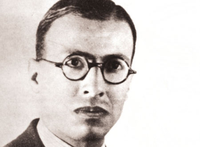
Nablus, Palestine | Unknown - Unknown
Ibrahim Tuqan was a prominent Palestinian poet born in Nablus to Abd al-Fattah Tuqan and Fawziyya Amin Asqalan. He had four brothers—Yusuf, Ahmad, Rahmi, and Nimr—and three sisters—Fadwa, Fataya, and Adiba. Tuqan married Samia Qasim Abdul-Hadi and had two children, Jafar and Urayb. His early education started at Rashadiyya Gharbiyya School in Nablus during World War I, and later, he moved to St. George's School in Jerusalem. Tuqan continued his education at the American University of Beirut (AUB) and earned a BA in literature in 1929. He then began teaching Arabic literature at the Najah School in Nablus and later at AUB. Tuqan wrote nationalist poetry, including "al-Thulatha' al-hamra'" (The Red Tuesday), during the 1929 Palestinian uprising. He joined the Arabic Section of Jerusalem Radio in 1936 but was dismissed in 1940 due to his resistance to promoting colloquial Arabic. He continued to write nationalist odes and worked at the Nablus Municipality. One of his most renowned odes, "Mawtini," written in 1934 and set to music by composer Muhammad Flayfil, gained widespread popularity across the Arab world. It eventually became the unofficial anthem of Palestine and was adopted as Iraq's anthem after the 2003 US invasion.He received the Jerusalem Medal for Culture, Arts, and Literature posthumously in 1990 from the PLO. His life inspired an Iraqi TV series titled "Ibrahim Tuqan." Ibrahim Tuqan died on May 2, 1941, in Jerusalem and was buried in Nablus. He is celebrated as a pioneering Palestinian poet, with his revolutionary and nationalist poetry leaving a lasting impact.